Bijgewerkt op 3 oktober 2017
De iPhone-hype is nog steeds niet voorbij: journalisten – zelf bijna uitsluitend Apple-gebruikers – lopen nog steeds over van bewondering voor dit apparaat. Je mag er gewoon niets negatiefs over zeggen, je moet zeggen dat het de beste telefoon is. Niemand lijkt te willen zien dat er betere alternatieven zijn voor deze telefoon. Het doet denken aan het sprookje van de nieuwe kleren van de keizer: iedereen is vol bewondering over de kleren omdat niemand dom gevonden wil worden, terwijl de keizer niets aan heeft.
Bloatware
Zo hoor je niemand over bloatware op de iPhone: apps van de fabrikant die voorgeïnstalleerd zijn en je niet kunt verwijderen. Nee, bloatware is alleen te vinden op Android-telefoons. Terwijl je die apps niet hoeft te gebruiken. Je kunt ze gewoon links laten liggen. De bloatware op Apple apparaten is een aheel nder verhaal. die ben je verplicht om te gebruiken hoezeer je het gebruik van die apps ook kunt verfoeien.
Je favoriete apps gebruiken op een iPhone is dan niet mogelijk. Je kunt bijvoorbeeld dol zijn op de Firefox-browser omdat je die kunt uitbreiden met een reclamefilter zodat je geen last hebt van alle troep die via advertenties binnenkomt. Je kunt die ook op een iPhone installeren. Maar elke keer als je in een andere app, bijvoorbeeld in een mailtje, op een link tikt, krijg je de standaard browser van Apple en dat is de browser van… Apple. Altijd. Dit kun je niet veranderen. Je moet de browser van de fabrikant gebruiken. En dit geldt voor alle bloatware op de iPhone. Je bent verplicht om die te gebruiken. Hoe goed de alternatieve apps ook zijn.
Apple bepaalt
En dit legt meteen bloot wat de filosofie van Apple is: je mag de telefoon alleen gebruiken zoals Apple wil dat je ‘m gebruikt. Je kunt ‘m nauwelijks aanpassen aan je eigen voorkeuren en bent verplicht de manier van werken zoals Apple die bedacht heeft te gebruiken ook al is die nog zo omslachtig.
Terug
Om deze reden en andere redenen is het besturingssysteem van Android nog steeds veel gebruiksvriendelijker. Een andere reden is bijvoorbeeld de terug-toets. Die ontbreekt op de iPhone. Op een Android telefoon kun je nadat je op een link hebt gedrukt en in een andere app belandt met één druk op de terug-toets terug naar de app met de link. Niet op de iPhone. Het is een raadsel waarom deze toets nog steeds ontbreekt op Apple apparaten.
Privacy
Over de privacy op Apple apparaten hoeven we ons sinds “Edward Snowden” geen illusies te maken. We weten nu dat Apple onderdeel uitmaakt van Prism en dat betekent dat alles wat je in het “eco-systeem” van Apple doet, wordt bekeken door de NSA, de Amerikaanse “AIVD”.
Wat mensen graag zouden willen weten
Een ander punt dat vrijwel geen aandacht krijgt in de media is de mensonwaardige arbeidsomstandigheden waaronder iPhones gemaakt worden. Terwijl mensen dit graag zouden willen weten en meer dan bereid zijn om hun keus voor een telefoon daardoor te laten bepalen.
Nog steeds hangen bij de fabriek netten om te voorkomen dat nog meer mensen zelfmoord plegen. O.a de BBC heeft erover bericht en de ZDF heeft er een schokkende reportage over gemaakt.
De situatie is vandaag de dag niet anders.
Dit maakt van de iPhone een telefoon waar niet alleen kopers een hoge prijs voor moeten betalen.
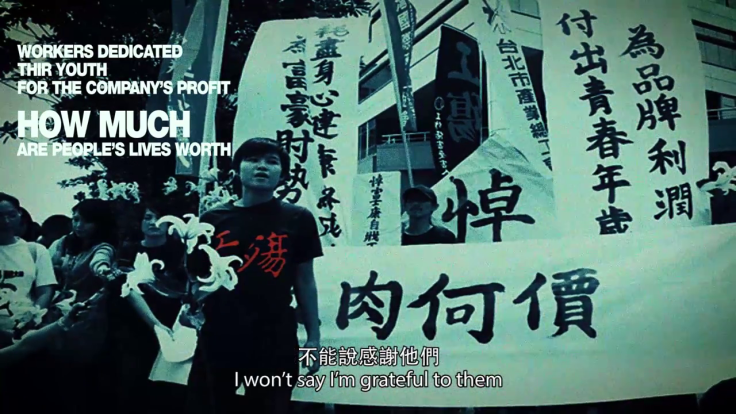
Meer informatie
How much does it worth? 勞動何價? (1 of 3)
How much does it worth? 勞動何價? (2 of 3)
Video’s van Sacom, Students and Scholars Against Corporate Misbehaviour over de werkomstandigheden bij Foxconn, de fabriek waar iPhones worden gemaakt.
Others pay the price for what we buy
Artikel Bread For All, organisatie betrokken bij Sacom:
Globalisation has ushered in an era of roduction that uses convoluted paths involving numerous producers from all over the world. Often, the aim is to fabricate goods as cheaply and swiftly as possible. Other people pay the real price of this way of producing.
Problematische arbeidsomstandigheden bij productie iPads en iPhones
Somo, 6 mei 2011
Het nieuwe rapport van SACOM beschrijft de arbeidsomstandigheden in de fabrieken van Foxconn in Shenzhen, Chengdu en Chongqing in China., Foxconn is een van ’s werelds grootste contract manufacturers en produceert voor verschillende merken. Apple is een van Foxconn’s belangrijkste klanten. Bij Foxconn in Chengdu worden volop iPads en iPhones geproduceerd. Het rapport van SACOM wijst op excessieve overuren, onbetaald overwerk, misleidende advertenties, steevaste miscalculatie van lonen, en loonsverhogingen die verkapt gepaard gaan met nog hogere productiviteitseisen.
Vorig jaar kwamen er diverse problemen aan het licht bij toeleveranciers van Apple in China. In 2010 ondernamen 19 Foxconn-werknemers een zelfmoordpoging; 16 brachten het er niet levend van af. In oktober 2010 liepen meer dan 137 Wintek-werknemers vergiftigingen op door werkzaamheden met n-hexaan, een uiterst giftig oplosmiddel. Wintek maakt touch screens voor iPads en iPhones. In hun pogingen om redelijke compensatie te verkrijgen schreven de getroffen werknemers ook Apple aan. Tot dus ver heeft Apple niet direct willen reageren op deze verzoeken om hulp.
The Truth of the Apple iPad Behind Foxconn’s Lies
Video SACOM, 6 juni 2011
A Day In The Life Of An iPhone Factory Worker
Fast Company, 29 juli 2013
At the second-largest Apple supplier factory in China, pregnant and underage workers put in 66-hour weeks (China’s legal max is 49) while being forced to sign falsified time cards, according to a nonprofit group called China Labor Watch.
Once a week you must sign a falsified time sheet meant for Apple inspectors. The sheet records 10 to 16 hours of overtime, when the real number is 20+ hours. Workers depend on overtime to make a living wage.
COMPLICIT – 9 min
Complicit, 4 maart 2014
Apple Store Employees Earn Less Than Supermarket Staff
Lifehacker, 6 juni 2014
Apple Australia has struck a new pay deal with its employees that will see them earning less than comparable supermarket workers. Maybe working for Apple isn’t such a Genius move.
Chinese workers pay a toxic price for their jobs making Apple’s iPhones and iPads
PRI, 17 september 2014
“When teenagers go into the factories, they’re going in as unskilled workers,” she says. “They’re often initially tasked with, basically, just wiping cell phone screens. That’s what a lot of the workers that I interviewed said that they had been doing.”
These teen workers usually use cleaning fluids that consist of several different chemicals. They’re also normally unaware of the chemical makeup of these cleaning solutions, and receive no training on how to handle them.
“It’s only after they fall sick that they start to become suspicious about what the source of their illness might be,” White says. “They really have no idea that they’re working with a poison in most cases.”
Apple ‘failing to protect Chinese factory workers’
BBC, 18 december 2014
One undercover reporter, working in a factory making parts for Apple computers, had to work 18 days in a row despite repeated requests for a day off.
Another reporter, whose longest shift was 16 hours, said: “Every time I got back to the dormitories, I wouldn’t want to move.
“Even if I was hungry I wouldn’t want to get up to eat. I just wanted to lie down and rest. I was unable to sleep at night because of the stress.”
BBC News Secret video of exhausted workforce in Chinese factory making Apple products
BBC reportage op YouTube, geplaatst op 18 december 2014
iPhone 6s factory investigation reveals Apple still violates human rights of workers
IBTimes, 22 oktober 2015
“The results of this investigation suggest to us that despite enjoying ever-growing commercial success, Apple refuses to do what’s necessary to ensure workers who make that success possible are treated fairly and work in safe environments,” Kevin Slaten, program coordinator at CLW, told IBTimes UK. “We can only conclude that Apple pursues profit maximisation for itself and its shareholders no matter the lives of people making Apple products.”
Dying for an iPhone: the lives of Chinese workers
China Dialoge, 15 april 2016
(….) When it comes to workers’ conditions, little appears to have changed. Workers we interviewed reported other major health concerns. At Foxconn Kunshan’s factory near Shanghai one worker said, “Prolonged direct contact with nickel in metal alloys and electroplating materials affects human skin. If I already have a rash, it will itch even more.” At Foxconn Chengdu’s “iPad city” workers operated polishing machines that produce clouds of microscopic aluminium dust 12 hours a day. “I’m breathing aluminium dust at Foxconn like a vacuum cleaner,” said one worker. With the workshop windows tightly shut, workers felt as if they were “suffocating.”
Apple is the Source of Mistreatment of Chinese Workers
China Labor, 24 augustus 2016:
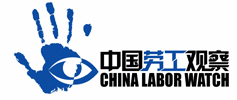
Excessive and illegal overtime work is still prevalent in Pegatron. Pegatron claimed that their ID check system could effectively control workers’ overtime hours, but this system did not have any effect in the departments where more overtime was needed. It is merely a tool for public relations.Of the 2015 paystubs. 62% had over 82 hours of overtime work per month. One worker put in 109 hours of overtime work per month, working 293 hour in tatal.
Pegatron has recruited many student interns, who had overtime work amounting to 80 hours per month on average. This is roughly the same amount as full-time employees. However, the Chinese law forbids companies from asking interns to work overtime.
5. The base wage is still too low in Pegatron, and workers have to rely on overtime pay to support themselves and their families. Workers who do not work overtime only earn around $213 USD after expenses are deducted.
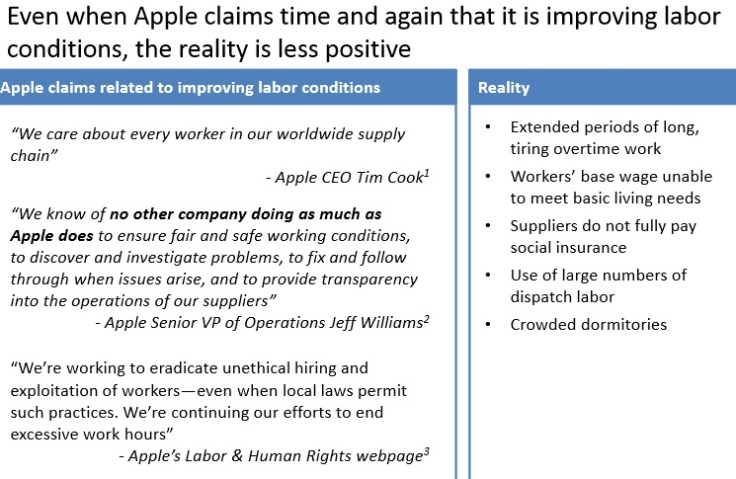
Pegatron is exploiting workers making Apple iPhone 7 in China – report
ZDNet, 28 augustus 2016
Further, China Labor Watch reckons that the total annual basic wages of 50,000 Pegatron workers was around $193 million US dollars in 2015. This compares with Tim Cook’s $378 million pay package on taking the top job at Apple, and the $73 million deal given to Angela Ahrendts when she joined from Burberry.
(…) Interns are not workers, they are students, often aged 17-18. They are not supposed to be working on production lines that have nothing to do with their studies. They’re not volunteering either: they are little more than slave labour.
As Apple’s profits decline, iPhone factory workers suffer, a new report claims
The Washington Post, 1 september 2016
As Apple watches its profits decline for the first time in 13 years, tightening production costs are pushing iPhone factory workers to working longer hours for less pay, a new study reports.
The report, released last week by China Labor Watch, revealed worsening labor conditions at Pegatron, one of Apple’s major iPhone factories based outside of Shanghai. The factory implemented excessive overtime hours that spanned up to 90 additional hours per month, according to the report, and overall wage cuts from $1.85 to $1.60 per hour on Pegatron workers over the past year.
UNDERCOVER IN AN IPHONE FACTORY
China Labor Watch, 24 maart 2017
The following letter comes from a New York University student who conducted an undercover investigation in an iPhone factory in China. Violations of human rights were documented.
According to the Could of Conduct, “Supplier shall provide workers with job-related, appropriately maintained personal protective equipment and instruction on its proper use.” However, in Changshuo, this is unfulfilled. In stations that with the noise warning sign, workers are not provided earplugs, such as the stations using the airbrush to clean the housing. In stations that with the laser warning sign, workers are not provided eye protection equipments. I worried these situations might damage workers’ health in a long term.
Apple: 1160 euro eerlijke prijs als je werknemers in China fatsoenlijk betaalt
De Speld, 13 september 2017
Er is veel kritiek op de hoge prijs van de nieuwe iPhone X. Volgens Apple-CEO Tim Cook is de prijs echter volledig gerechtvaardigd: “Dit is wat je voor een telefoon betaalt als je de werknemers in Azië een redelijk salaris geeft. Dat doen we niet, maar gewoon even voor het idee.”
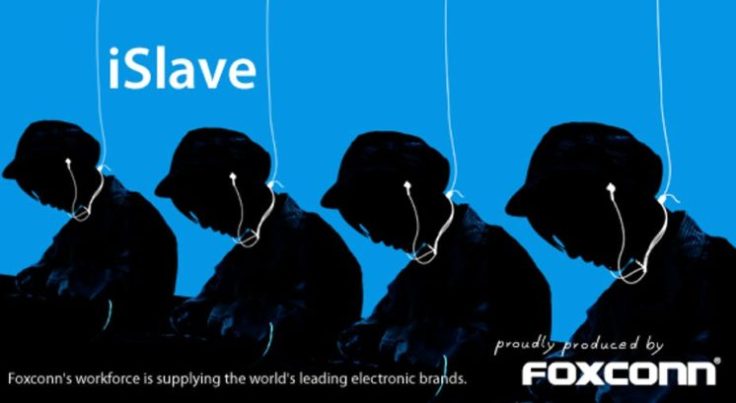
A bloody decade of the iPhone
GoodElectronics, 27 september 2017
I look back at the first ten years of the iPhone and see a bloody decade of labour abuse, especially in Chinese factories such as those run by Foxconn, the world’s largest electronics manufacturer. At one point Foxconn had more employees in China than the US armed forces combined.
Foxconn makes most of its money from assembling iPhones, iPads, iMacs and iPods. Its notorious “military management” was blamed for causing a string of 17 worker suicides in 2010.
The company tried so hard to stop the suicides, not by digging out the roots of exploitation, but by erecting “anti-jumping nets” atop its buildings. Never before has a modern factory hidden behind such suicide-prevention netting, which last appeared on transatlantic slave ships centuries ago.
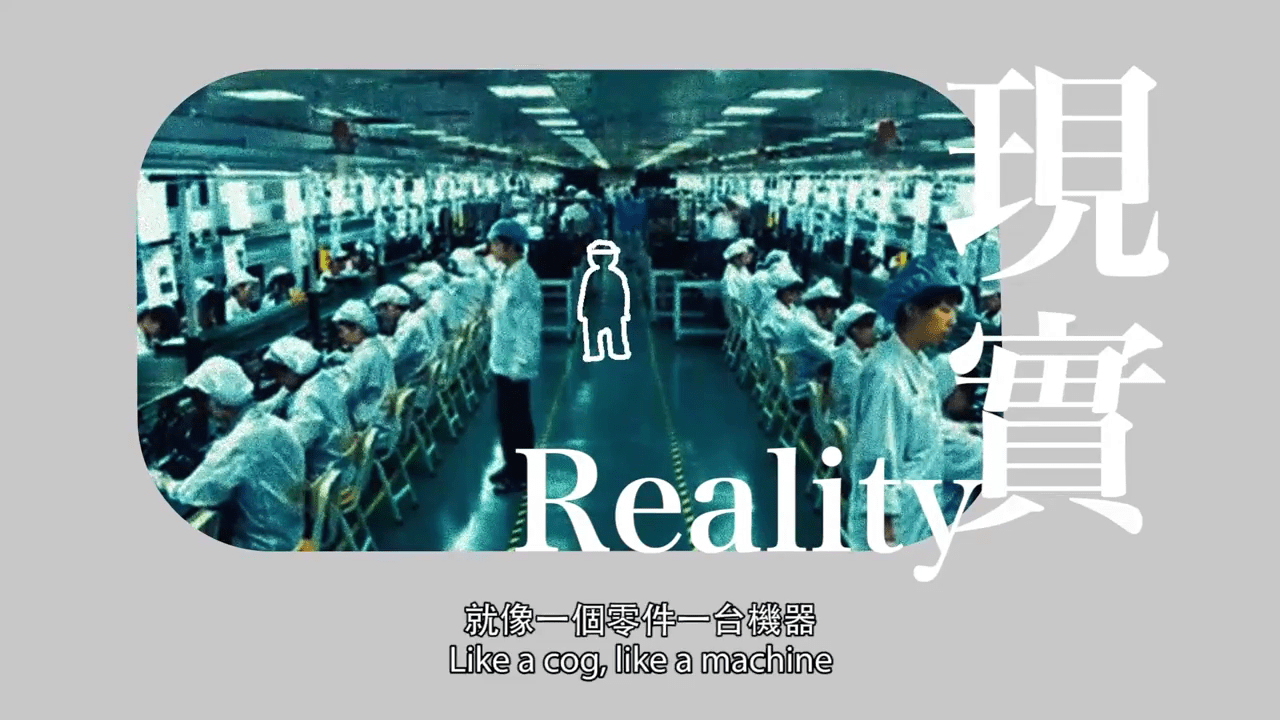






Je moet ingelogd zijn om een reactie te plaatsen.